|
|
|
Sort Order |
|
|
|
Items / Page
|
|
|
|
|
|
|
| Srl | Item |
| 1 |
ID:
153838


|
|
|
|
|
| Summary/Abstract |
The parallel rise of India and China is one of the most significant strategic developments in the twenty-first century. While the West has enthusiastically welcomed the rise of India, it has been met with a more ambivalent response from China. India is sending complicated signals about its preferred status on the global stage. Struggling for recognition as a Great Power, India is also trying to maintain solidarity with developing countries. While Chinese elites mostly view it as a positive development, China's accommodation of India's rise has been partial, conditional and inconsistent. China's interpretations of India's signals largely depend on China's own identity, as well as political calculations. India's efforts to foster solidarity among developing countries resonate well with Chinese elites. The Chinese public has received Indian Prime Minister Narendra Modi's public diplomacy positively, and India's diplomatic activism has increased its profile in the eyes of China's policy elites. China is hesitating to accommodate some aspects of India's Great Power aspirations, but status politics is not always a zero–sum game. Chinese elites see improvement in the Sino-Indian relationship as a condition for China's greater acceptance of India's Great Power aspirations, and there is still some room for bargaining and mutual accommodation. While there is great potential for cooperation between India and China, distrust and suspicions continue to shape the trajectories of the relationship.
|
|
|
|
|
|
|
|
|
|
|
|
|
|
|
|
| 2 |
ID:
153835
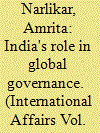

|
|
|
|
|
| Summary/Abstract |
India has for long been accused of having a nay-saying attitude in global governance. In this article, I assess the potential for change under Prime Minister Narendra Modi's leadership. The first section provides a brief overview of India's record in global governance. In the second section, I analyse the mechanisms whereby India may now become more able and willing to take on global responsibilities. In the third section, I investigate whether this more positive approach to global governance has in fact been borne out in reality. I do so by comparing trends in India's negotiation behaviour across two issue-areas: climate change mitigation and multilateral trade. The two cases are interesting because both deal with difficult multilateral deadlocks. India, moreover, has historically attracted a considerable share of the blame for the recurrence of these deadlocks. I find that although India's negotiating behaviour in the two cases shows some important differences of degree, there seems to be a qualitative and positive change in both in the same direction under the present political leadership. In trade, India has become considerably less obstructionist than before; in climate change it has adopted a dramatically proactive, value-creating and agenda-setting role. The fourth section highlights the risks and challenges that could still derail India's evolving role in global governance. The risks are serious, but the article still finds enough evidence to conclude on a note of cautious optimism.
|
|
|
|
|
|
|
|
|
|
|
|
|
|
|
|
| 3 |
ID:
153837
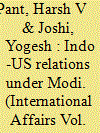

|
|
|
|
|
| Summary/Abstract |
This article examines the transformation in Indo-US relations in the first two years of the Modi government. It first discusses the state of Indo-US relations before Modi's ascent to the premiership in May 2014. The challenges confronting the relationship were not strictly bilateral; Modi's image and its historical baggage had also made them personal. Subsequently, the article elaborates on the significant progress made in the bilateral relationship during the first two years of the Modi government. The concluding section explains the rationale behind Modi's outreach to the United States. Three factors appear to have had a significant influence: a conviction that India's developmental priorities cannot be met without substantive cooperation with the US; the strong political authority Modi enjoys within his own party and in the Indian parliament; and the structural changes in India's security environment brought about by an aggressive China and its growing strategic convergence with Pakistan, leading to a re-think on ‘non-alignment’ as a guiding principle of foreign policy.
|
|
|
|
|
|
|
|
|
|
|
|
|
|
|
|
| 4 |
ID:
153830


|
|
|
|
|
| Summary/Abstract |
The 70th anniversary year of India's independence after two centuries of British colonial rule provides an excellent occasion to take the measure of a country that, today, is pivotal for both Asian and international stability. At 70, despite the persistent domestic challenges of poverty and inequality,1 India is widely considered a rising power,2 and is indisputably the world's largest democracy. In 2015, the Indian economy grew at a rate of 7.5 per cent, faster than that of China.3 As a nuclear-armed state, India enjoys recognition as a responsible nuclear power by key stakeholders in the non-proliferation regime, despite not being a signatory to the Nuclear Non-Proliferation Treaty.
|
|
|
|
|
|
|
|
|
|
|
|
|
|
|
|
| 5 |
ID:
153831
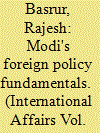

|
|
|
|
|
| Summary/Abstract |
The advent of Narendra Modi as prime minister has produced considerable debate about the direction that Indian foreign policy might take under his stewardship. While there are diverse ways in which one might assess Modi's foreign policy vis-à-vis the major powers, three overarching questions are of central importance. First, given his reputation as a staunch Hindu nationalist, to what extent do his ideological leanings influence Modi's foreign policy, especially with respect to the use of national power? Second, how is Indian policy towards the major powers designed? Are there signs of a classic balance of power approach drawing it towards the US and Japan, and against China? Finally, how is Indian foreign policy configured towards the objective of attaining higher status in the states system? Above all, is Modi significantly different from his predecessors? It is shown that there is no significant shift in the use of power arising from the ‘Hindu’ content in Modi's foreign policy; that his approach to the major powers reflects continuity (with some variations) by way of a focus on strategic partnerships; and that the quest for status is in line with the strategy pursued by previous prime ministers. In sum, there is no substantive change in the trajectory of Indian foreign policy and rising India's future direction is likely to remain both predictable and moderate.
|
|
|
|
|
|
|
|
|
|
|
|
|
|
|
|
| 6 |
ID:
153836


|
|
|
|
|
| Summary/Abstract |
Periodically, India has sought to act as a ‘normative power’ in international affairs, advancing a normative agenda about how states and other actors ought to behave, what norms and rules should regulate their interactions, and what institutions should exist to make and enforce them. The rise to power of Narendra Modi, who became India's prime minister in May 2014, with a declared aspiration to once more make India a vishwaguru (‘world guru’) and a ‘leading power’, has generated debate about whether India will again become a normative power. This article analyses the intellectual resources with which Modi might construct that new normative agenda. These resources include the work of a number of key Hindu nationalist thinkers with whom Modi is well acquainted, but also the thought of Swami Vivekananda, for whom Modi claims a special devotion. The article concludes that constructing a new normative agenda for a revived ‘normative power India’ out of these resources will be difficult, given the limited usefulness of these intellectual resources, and that Modi's government will likely continue to pursue an essentially pragmatic foreign policy designed above all to further India's domestic economic development.
|
|
|
|
|
|
|
|
|
|
|
|
|
|
|
|
| 7 |
ID:
153834


|
|
|
|
|
| Summary/Abstract |
Does Narendra Modi bring anything substantively new to Indian foreign policy? This article assesses Modi's record towards Pakistan and China, arguing that he has significantly changed the course of India's diplomacy, at two levels—bilateral diplomacy and coalition diplomacy. India has traditionally followed a policy of slow-to-anger, prudential bilateral diplomacy and, in the name of non-alignment, reluctant coalition-building against both powers. Under Modi, New Delhi has adopted a more assertive stance bilaterally and has actively sought to recruit third parties into a diplomatic coalition against Pakistan and China. Modi's assertive bilateralism has translated into an insistence that anti-terrorism is the only subject of discussion and that the Kashmir dispute with Pakistan is off the table. In the case of Beijing, assertive bilateralism has meant reversing India's traditional stance of normalization of relations leading to a border settlement by arguing that quicker progress on a settlement must be the condition for any further diplomatic normalization. Modi's coalition diplomacy has entailed an active engagement with the US, the Gulf countries and even China against Pakistan, and with the US, Australia, Japan, Vietnam and the Indian Ocean states against China. The objective is not alliance-building but rather the application of diplomatic pressures against India's two rivals. Modi's diplomacy has been marked by a cooperation–defection cycle with both powers, signalling a willingness to cooperate on India's terms and defect when it does not get its way. Not surprisingly, relations with both Pakistan and China have come under considerable strain.
|
|
|
|
|
|
|
|
|
|
|
|
|
|
|
|
| 8 |
ID:
153832


|
|
|
|
|
| Summary/Abstract |
In the post-Cold War era, a number of scholars have observed and encouraged greater ‘pragmatism’ in India's foreign policy. A ‘pragmatic’ foreign policy has been understood as one that rejects India's earlier reliance on Nehruvian ‘idealism’ or ‘moral posturing’, and instead pursues power and material interests. In the wake of his election to power, Prime Minister Narendra Modi, too, has been celebrated by scholars and the media as a pragmatic leader who will be able to dispense with earlier ideas and ideologies and bring about radical changes to Indian foreign policy. In this article, we problematize these ‘substantive’ readings of pragmatism. Instead we present an alternative, ‘procedural’ reading of foreign policy pragmatism that emphasises the selection and fusion—rather than the abandonment—of different ideas and ideological commitments in order to effect foreign policy change. By demonstrating procedural pragmatism at work in two case-studies under Modi's leadership—the resolution of India's territorial dispute with Bangladesh, and the establishment and public celebration of a UN-recognized International Day of Yoga—we show how Modi's pragmatic approach to foreign policy-making is responsive to both Hindutva (Hindu nationalist ideology) and entrenched foreign policy ideas in India. Our central argument is that Modi is neither unique nor uniquely pragmatic, and like many Indian leaders before him, his pragmatism cannot simply abandon ideas and ideology, but is compelled to respond to them in response to domestic and international political logics.
|
|
|
|
|
|
|
|
|
|
|
|
|
|
|
|
| 9 |
ID:
153839


|
|
|
|
|
| Summary/Abstract |
The article looks at the rise of India from UK perspectives, a rise and response which are driven by economics. Five themes are pursued, namely the pre-2002 legacy of the past, the 2002–2016 developing partnership, the politics of the current relationship, the economics of the relationship, and the post-Brexit future. With regard to the pre-2002 legacy of the past there is the colonial legacy that both draws the two countries together, yet also leaves friction points of perspectives and sensitivities. The 2002–2016 developing partnership deals with the progress and process of UK–India links during the Blair, Brown and Cameron periods. With regard to the current economics of the relationship, India's economics-driven rise made it a potential magnet for British exports and for two-way investments, and an alternative to China for the UK. With regard to the current politics of the relationship, the disappearance of the Soviet Union had left the way for convergence of two English speaking liberal democracies, who share important anti-terrorism and anti-jihadism concerns. However, while trade has increased between the UK and India, its volume level has not met expectations, and UK exports have lagged back, thereby leaving a growing trade deficit. Future UK–India relations are dramatically being reshaped by the Brexit referendum vote for the UK to leave the EU, and with it the prospects of a UK–India Free Trade Agreement being negotiated. However, while the economics and politics of the relationship make India increasingly important to the UK, it leaves the UK of secondary importance to India.
|
|
|
|
|
|
|
|
|
|
|
|
|
|
|
|
| 10 |
ID:
153840
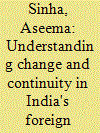

|
|
|
|
|
| Summary/Abstract |
The field of Indian foreign policy is rich and wide ranging, offering new empirical material across a broad array of topics and relationships. This article reviews three recent books on the subject, with an eye towards evaluating change amid continuity in the pursuit of Indian foreign policy. This scholarship calls out for a new paradigm to understand India's changing position and actions at global, regional and domestic levels. I argue that Indian foreign policy can and should be seen through the prism of an open border, interdependence framework, wherein both the domestic and global levels are analysed in a linked manner. While the literature surveyed here does not yet offer a new paradigm, some common findings suggest the need for newapproaches. We also need to find and use new sources of data and seek ways to measure institutional effects in foreign policy. The task of measurement and theoretical modelling is made more challenging by the need to theorize the linkages across levels and to measure foreign policy variables in different countries simultaneously.
|
|
|
|
|
|
|
|
|
|
|
|
|
|
|
|
| 11 |
ID:
153833
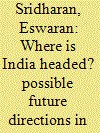

|
|
|
|
|
| Summary/Abstract |
The Bharatiya Janata Party (BJP)-led National Democratic Alliance (NDA) government of Prime Minister Narendra Modi has been extraordinarily active in foreign affairs, logging as many as 48 foreign visits in its first two years for both bilateral and multilateral meetings, as well as a host of high-level visits to India by world leaders including by the heads of government of the US, China, UK, France and Japan. What have been the drivers of this extraordinary foreign policy dynamism and what does it portend for possible future directions in Indian foreign policy, not only of the current government but into the more distant future? This article consists of a reasoned speculation about possible future directions in Indian foreign policy, building on recent foreign policy developments and also engaging with the literature on power transitions and rising powers, and posing the larger geopolitical question of what kind of power India will be in the future. It argues that the direction of Indian foreign policy will be substantially dependent on US–China–Russia dynamics in the Asia–Pacific region and that the gradual shift towards the United States and its allies and partners will continue. It concludes that India will find it difficult, even with sustained high growth, to join the ranks of the Great Powers due to being constrained by geography and by the capabilities of its nuclear neighbours.
|
|
|
|
|
|
|
|
|
|
|
|
|
|
|
|
|
|
|
|
|